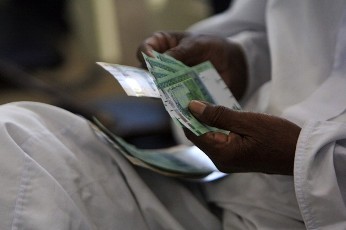Sudanese president due to sign decision on raising minimum wage: SWTUF
September 29, 2013 (KHARTOUM) – The Sudanese Workers Trade Unions Federation (SWTUF) announced on Sunday that president Omer Hassan Al-Bashir will soon sign a decision by which the minimum wage will be raised retroactively effective January 2013.

It was later supplemented by another 100 pounds in allowance which brought up the lowest wage on the scale to 365 pounds ($82.95) but as it is not stipulated by law, it could be withdrawn at any time. In fact, many sections of the government claimed that the extra 200 pounds were never received by their employees.
But the SWTUF asserted that those who have not received the 200 pounds bump will do so once Bashir signs the decision on raising minimum wages. It also emphasized that all procedures to effect the decision has been taken in the cabinet and other government agencies.
The union lauded the move to implement the pay hike describing it as an incentive for more production but at the same time acknowledged that there remains a big gap between salaries and cost of living in Sudan.
The timing of the decision coincides with one of the worst protests Sudan has witnessed in years over the government’s decision this week to lift fuel subsidies which almost doubled their prices.
A gallon of gasoline now costs 21 Sudanese pounds ($4.77 based on official exchange rate) compared to 12.5 pounds ($2.84).
Diesel also went from 8 pounds ($1.81) a gallon to 14 pounds ($3.18).
Cooking gas cylinders are now are priced at 25 pounds ($5.68) from 15 pounds ($3.40).
The government said that 33 people were killed in the demonstrations but activists and opposition put the figures in the 100’s.
Yesterday, 31 NCP officials and Islamists petitioned president Bashir to reinstate the fuel subsidies, end the killing of protestors and implement wide political and economic reforms.
However, Sudanese officials insist that there is no backing from the subsidies cut stressing that it is necessary to prevent an economic and fiscal collapse.
The government spokesperson who is also Sudan’s information Minister Ahmed Bilal Osman told Agence France Presse (AFP) there was no going back on the fuel price increases.
“This is the only way out,” Osman said in a telephone interview, adding that the government knew “riots” would occur but could not sustain the cost of billions of dollars in subsidies.
“Our economy cannot tolerate such support,” he said. “We have to carry on. We know it is a bit heavy for the people”.
Sudan, already crippled by US economic and financial sanctions and $40 billion plus debt, lost 75% of its oil with the secession of the south in July 2011.
The East economic nations relied almost exclusively on oil exports for revenue and hard currency which critics say has made government overlook boosting other sectors such as agriculture and industry.
(ST)

